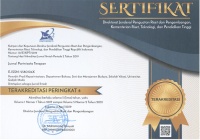Efektivitas Penyampaian Konten Eduwisata Budaya Terhadap Pemahaman Siswa Sekolah Menengah Pertama di Museum Sonobudoyo Yogyakarta
Nuryuda Irdana(1*), Faizatush Sholikhah(2)
(1) Bachelor of Applied Tourism and Travel Business Study Program, Department of Foreign Languages, Arts, and Culture Management Vocational College, Universitas Gadjah Mada
(2) Bachelor of Applied Archives and Records Management Study Program, Department of Foreign Languages, Arts, and Culture Management Vocational College, Universitas Gadjah Mada
(*) Corresponding Author
Abstract
Museums are present in the community as a place to see information and collections about events that occurred in the past. One of the museums that is well known by the public is Sonobudoyo Museum. Sonobudoyo Museum has a very strategic location because it is located in the center of Yogyakarta, which is a cultural city in Indonesia. Museums are closely related to educational tourism. Most junior high school students are in the age range of 12 - 17 years. As adolescents enter this stage, they acquire the ability to think abstractly by manipulating ideas, without dependence on concrete manipulation. The objectives of this research are 1) Knowing the type of educational content contained in the Sonobudoyo Museum. And 2) Knowing the effectiveness of delivering educational content at Sonobudoyo Museum on the understanding of junior high school students. The analytical tool used in this research is the Wilcoxon Test. The material to be analyzed is primary data obtained from direct observation, interviews, and questionnaires. The survey method is used to analyze the second research objective. The approach used is a quantitative approach. The results of the analysis show that the types of educational content available at Sonobudoyo Museum are pre-historic times, traditional children's games, travel and transportation, banquets and events, performing arts, traditional weapons, and clothing and batik. The results of further analysis regarding the effectiveness of the delivery of edu-tourism content at Sonobudoyo Museum on the understanding of junior high school students show that the delivery of edu-tourism content at Sonobudoyo Museum can provide an understanding of pre-historic times, traditional children's games, travel and transportation, banquets and events, performing arts, traditional weapons, and clothing and batik.
Keywords
Full Text:
PDFReferences
Ahnaf, M.D., Hermawan, Y. dan Shanti, F.U. (2021). Pemanfaatan Museum Sonobudoyo Sebagai Sumber Belajar Untuk Masyarakat. Lifelong Education Journal. Vol 1 (1) 2021. Ardika, I.W. (2012). Museum Sebagai Daya Tarik Wisata: Perspektif Multikulturalisme. Ikatan Ahli Arkeologi (IAAI) Indonesia. Bereempat. (2020). Bisnis Eduwisata Kian Booming. https://berempat.com/bisnis/umkm/12168/bisnis-eduwisata-kian-booming/ Dinas Kebudayaan DIY. (2020). Museum Sonobudoyo. http://gregahmuseum.jogjaprov.go.id/daftar_museum/detail/3 Fitriansyah, F. dan Kasmin. (2022). Pemanfaatan Museum Sebagai Wisata edukasi dan Media Pembelajaran Sejarah. Cakrawala-Jurnal Humanioran dan Sosial , Vol 22 (2). 2022 Gay, L.R. dan Diehl, P.L. (1992). Research Methods for Business and Management, New York: MacMillan Publishing Company. Jarvis, M. (2000). Theoretical approaches in psychology. Psychology Press. Kemdikbud. (2020). Pengertian Museum. https://kebudayaan.kemdikbud.go.id/muspres/pengertian-museum/ Kemdikbudristek Republik Indonesia. (2019). Pengertian Museum. https://museum.kemdikbud.go.id/pengertian-museum Kurniati, D. (2015). Potensi Pengembangan Agrowisata sebagai Kawasan Eduwisata Lokal di Agrowisata Cilangkap Jakarta Timur. Skripsi. Jakarta: UIN Syarif Hidayatullah. Miloveva, N. (2024). Eduwisata Budaya Sejak Usia Dini, Apa Pentingnya?. https://www.mtssuryabuana.sch.id/berita/336-eduwisata-budaya-sejak-usia-dini,-apa-pentingnya.html#:~:text=Eduwisata%20budaya%20merupakan%20hal%20yang,penerus%20untuk%20mempertahankan%20budaya%20tersebut. Museum Kebangkitan Nasional Direktorat Jenderal Kebudayaan Republik Indonesia. (2017). Museum Sebagai Sarana Eduwisata dan Rekreasi. https://kebudayaan.kemdikbud.go.id/mkn/musuem-sebagai-sarana-eduwisata-dan-rekreasi/ Museum Sonobudoyo Yogyakarta. 2024. Sekilas Museum Sonobudoyo. https://www.sonobudoyo.com/id/museum/sekilas Prasetyo, D., Manik, T.S., dan Riyanti, D. (2021). Pemanfaatan Museum Sebagai ObjekWisata edukasi. Kepariwisataan: Jurnal Ilmiah. Vol 15 (1) 2021. Saniyyah dan Putri, A.Y.E. (2023). Museum Sonobudoyo: Sejarah, Harga Tiket, dan Daya Tariknya. https://www.detik.com/jogja/plesir/d-7088980/museum-sonobudoyo-sejarah-harga-tiket-dan-daya-tariknya Sarwono, Jonathan. (2006). Metode Penelitian Kuantitatif dan Kualitatif. Yogyakarta: Graha Ilmu Siregar, Syofian. (2013). Metode Penelitian Kuantitatif. Jakarta: PT Fajar Interpratama Mandiri Sitepu, F.A.B., Atiqah, A.N. (2022). Pengaruh Penerapan Konsep Digitalisasi di Museum Sonobudoyo Yogyakarta. Kepariwisataan: Jurnal Ilmiah. Vol 16 (1) 2022. Tien, Chieh-Ching. (2011). The Role of Museum Cluster in the Cultural Tourism Industry. http://webcache.googleusercontent.com/search?hl=id&q=cache:2j_vj6BpVwg:http://www. 8/26/2011. Wilis, R. (2011). Teori-teori belajar dan pembelajaran. Bandung: Erlangga. Zaiontz, Charles. (2021). Wilcoxon Signed-Ranks Test. https://www.real-statistics.com/non-parametric-tests/wilcoxon-signed-ranks-test/.
Article Metrics
Refbacks
- There are currently no refbacks.
Copyright (c) 2024 Nuryuda Irdana

This work is licensed under a Creative Commons Attribution-ShareAlike 4.0 International License.













